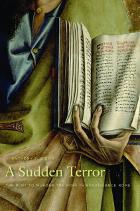
In 1468, on the final night of Carnival in Rome, Pope Paul II sat enthroned above the boisterous crowd, when a scuffle caught his eye. His guards had intercepted a mysterious stranger trying urgently to convey a warning—conspirators were lying in wait to slay the pontiff. Twenty humanist intellectuals were quickly arrested, tortured on the rack, and imprisoned in separate cells in the damp dungeon of Castel Sant’Angelo.
Anthony D’Elia offers a compelling, surprising story that reveals a Renaissance world that witnessed the rebirth of interest in the classics, a thriving homoerotic culture, the clash of Christian and pagan values, the contest between republicanism and a papal monarchy, and tensions separating Christian Europeans and Muslim Turks. Using newly discovered sources, he shows why the pope targeted the humanists, who were seen as dangerously pagan in their Epicurean morals and their Platonic beliefs about the soul and insurrectionist in their support of a more democratic Church. Their fascination with Sultan Mehmed II connected them to the Ottoman Turks, enemies of Christendom, and the love of the classical world tied them to recent rebellious attempts to replace papal rule with a republic harking back to the glorious days of Roman antiquity.
From the cosmetic-wearing, parrot-loving pontiff to the Turkish sultan, savage in war but obsessed with Italian culture, D’Elia brings to life a Renaissance world full of pageantry, mayhem, and conspiracy and offers a fresh interpretation of humanism as a dynamic communal movement.

A revealing account of the lives and work of Ethiopian Orthodox pilgrims in sixteenth-century Rome, examining how this African diasporic community navigated the challenges of religious pluralism in the capital of Latin Christianity.
Tucked behind the apse of Saint Peter’s Basilica in Rome is the ancient church of Santo Stefano. During the sixteenth century, Santo Stefano hosted an unusual community: a group of Ethiopian Orthodox pilgrims whose faith and culture were both like and unlike those of Latin Europe. The pilgrims of Santo Stefano were the only African community in premodern Europe to leave extensive documents in their own language (Gǝʿǝz). They also frequently collaborated with Latin Christians to disseminate their expert knowledge of Ethiopia and Ethiopian Christianity, negotiating the era’s heated debates over the boundaries of religious belonging.
Translating Faith is the first book-length study of this community in nearly a century. Drawing on Gǝʿǝz and European-language sources, Samantha Kelly documents how pilgrims maintained Ethiopian Orthodox practices while adapting to a society increasingly committed to Catholic conformity. Focusing especially on the pilgrims’ scholarly collaborations, Kelly shows how they came to produce and share Ethiopian knowledge—as well as how Latin Christian assumptions and priorities transformed that knowledge in unexpected ways. The ambivalent legacies of these exchanges linger today in the European tradition of Ethiopian Studies, which Santo Stefano is credited with founding.
Kelly’s account of the Santo Stefano pilgrim community is a rich tale about the possibilities and pitfalls of ecumenical dialogue, as well as a timely history in our own age marked by intensive and often violent negotiations of religious and racial difference.
READERS
Browse our collection.
PUBLISHERS
See BiblioVault's publisher services.
STUDENT SERVICES
Files for college accessibility offices.
UChicago Accessibility Resources
home | accessibility | search | about | contact us
BiblioVault ® 2001 - 2024
The University of Chicago Press









